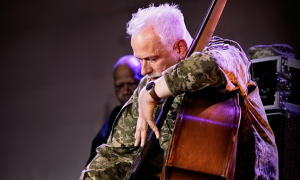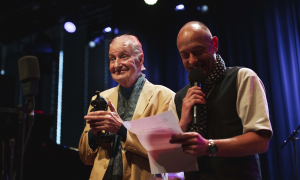Home » Jazz Articles » Profile » Ambrose Jackson
Ambrose Jackson
In the jazz world, an enormous amount of credence is given to the musician who appears on, to use the parlance, "countless sessions." Yet this ignores circumstances that can take a player on a different path and one can have significance even with the sparsest of discographies. An excellent example of this phenomenon is trumpeter Ambrose Jackson.
Jackson was born in Washington, DC in 1940. He studied classical trumpet and earned his Masters of Music Education from Catholic University of America in 1965. Jackson then went on to have a tripartite musical career: teaching trumpet at Howard University, being a member of the US Army Band Herald Trumpets (playing at President Kennedy's funeral) and touring both the US and Europe with the likes of Otis Redding. The first and third roles were instrumental in what would become an especially productive era for Jackson. Liking Europe after his visit there, Jackson went back on summer holiday. There, he "got to Paris and ran into [alto saxophonist]

Marion Brown
saxophone, alto1931 - 2010
It was while in Europe, alongside playing with folks like

Sunny Murray
drums1937 - 2017

Steve Lacy
saxophone, soprano1934 - 2004
Jackson began studying composition with Jean Catoire. "He was the type of teacher that encouraged us to find or to search for our own personal voice. Nothing was incorrect," remembers Jackson. At the same time, he "started going to these seminars and lectures at the Sorbonne...and after a while I started amassing credits and it got to the point I had enough credits...to get a Master's in Ethnomusicology. And before long I had enough credits to get a Doctorate. But I had to write a thesis so I went on and all I had to do was the field work." This led to a six-month trip to Cameroon, where Jackson studied "the traditional uses of the balafon...like marriages, funerals, victorious occasions." While in Cameroon, Jackson organized two concerts with a big band made up of local musicians and players from the Army band. "We gave a concert in a stadium and had 10,000 people. It happened to be during the bicentennial year, 1976, so the American Ambassador gave me a nice liberty bell with an inscription as far as contributing to relations between Cameroon and the United States."
Jackson returned to the States in the '80s, working as a freelance musician, including a lengthy stint as part of drummer

Charlie Persip
drums1929 - 2020
Recommended Listening:
Marion Brown, Le Temps Fou (Polydor, 1968)
Marion Brown, Gesprachsfetzen (Calig, 1968)
Sunny Murray, Eponymous (Shandar, 1968)
Marion Brown, In Sommerhausen (Calig, 1969)
Alan Silva/Celestrial Communication Orchestra, My Country (Leo, 1971)
Steve Lacy, Wordless (Futura, 1971)
Tags
Ambrose Jackson
Profiles
Andrey Henkin
United States
New York
New York City
Marion Brown
Sunny Murray
Steve Lacy
Charli Persip
Comments
PREVIOUS / NEXT
Support All About Jazz
 All About Jazz has been a pillar of jazz since 1995, championing it as an art form and, more importantly, supporting the musicians who make it. Our enduring commitment has made "AAJ" one of the most culturally important websites of its kind, read by hundreds of thousands of fans, musicians and industry figures every month.
All About Jazz has been a pillar of jazz since 1995, championing it as an art form and, more importantly, supporting the musicians who make it. Our enduring commitment has made "AAJ" one of the most culturally important websites of its kind, read by hundreds of thousands of fans, musicians and industry figures every month.
Go Ad Free!
To maintain our platform while developing new means to foster jazz discovery and connectivity, we need your help. You can become a sustaining member for as little as $20 and in return, we'll immediately hide those pesky ads plus provide access to future articles for a full year. This winning combination vastly improves your AAJ experience and allow us to vigorously build on the pioneering work we first started in 1995. So enjoy an ad-free AAJ experience and help us remain a positive beacon for jazz by making a donation today.

New York City
Concert Guide | Venue Guide | Local Businesses
| More...








 Buy Now
Buy Now





















